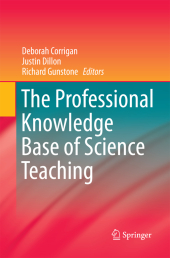 Neuerscheinungen 2014Stand: 2020-02-01 |
Schnellsuche
ISBN/Stichwort/Autor
|
Herderstraße 10
10625 Berlin
Tel.: 030 315 714 16
Fax 030 315 714 14
info@buchspektrum.de |

Deborah Corrigan, Justin Dillon, Richard Gunstone
(Beteiligte)
The Professional Knowledge Base of Science Teaching
Herausgegeben von Corrigan, Deborah; Dillon, Justin; Gunstone, Richard
2011. 2014. xvi, 326 S. 235 mm
Verlag/Jahr: SPRINGER NETHERLANDS; SPRINGER 2014
ISBN: 9401782970 (9401782970)
Neue ISBN: 978-9401782975 (9789401782975)
Preis und Lieferzeit: Bitte klicken
This book brings together international researchers to consider what constitutes evidence of high quality science teaching, on what basis such evidence can be judged, and how such evidence reflects the knowledge basis of the modern day science teacher.
Over the past twenty years, much has been written about the knowledge bases thought necessary to teach science. Shulman has outlined seven knowledge domains needed for teaching, and others, such as Tamir, have proposed somewhat similar domains of knowledge, specifically for science teachers. Aspects of this knowledge have changed because of shifts in curriculum thinking, and the current trends in science education have seen a sharp increase in the significance of the knowledge bases. The development of a standards-based approach to the quality of science teaching has become common in the Western world, and phrases such as "evidence-based practice" have been tossed around in the attempt to "measure" such quality. The Professional Knowledge Base of Science Teaching explores the knowledge bases considered necessary for science teaching. It brings together a number of researchers who have worked with science teachers, and they address what constitutes evidence of high quality science teaching, on what basis such evidence can be judged, and how such evidence reflects the knowledge basis of the modern day professional science teacher. This is the second book produced from the Monash University- King´s College London International Centre for the Study of Science and Mathematics Curriculum. The first book presented a big picture of what science education might be like if values once again become central while this book explores what classroom practices may look like based on such a big picture.


